Financial System Adaptability and Resilience
Financial systems differ across countries and tend to evolve slowly over time. Their structure is typically stable, but their resilience is often tested. A well-functioning financial system is vital for economic development, as it ensures that capital flows to the most productive and valuable investment opportunities. However, systemic vulnerabilities can have far-reaching consequences. For example, the 2007–08 global financial crisis emerged from within the financial sector itself when complex financial products fuelled a credit bubble in the U.S. housing market, threatening global economic stability when the bubble burst. That event led to extensive policy and regulatory reforms to strengthen financial system resilience.
Financial systems continue to face significant challenges. External shocks like the COVID-19 pandemic, the climate crisis, the green economic transition, and the energy crisis driven by geopolitical conflict all underscore the importance of financial systems that can absorb shocks and adapt to changing economic conditions. Motivated by these pressing issues, we investigate how financial systems respond to crises, which institutions and policies improve resilience, and the role of finance systems' setup in broader economic transformations. We use diverse data sources, including bank and firm-level data, regulatory reports, and house price and election data, to inform evidence-based policy.
Research Cluster
Financial Resilience and RegulationYour contact

- Department Financial Markets
EXTERNAL FUNDING
08.2022 ‐ 07.2025
OVERHANG: Debt overhang and green investments - the role of banks in climate-friendly management of emission-intensive fixed assets
The collaborative project “Debt Overhang and Green Investments” (OVERHANG) aims to investigate the role of banks in the climate-friendly management of emission-intensive fixed assets. This will identify policy-relevant insights on financial regulation, government-controlled lending and financial stability, as well as raise awareness among indebted stakeholders.
01.2015 ‐ 12.2019
Interactions between Bank-specific Risk and Macroeconomic Performance
07.2016 ‐ 12.2018
Relationship Lenders and Unorthodox Monetary Policy: Investment, Employment, and Resource Reallocation Effects
Leibniz Association
We combine a number of unique and proprietary data sources to measure the impact of relationship lenders and unconventional monetary policy during and after the European sovereign debt crisis on the real economy. Establishing systematic links between different research data centers (Forschungsdatenzentren, FDZ) and central banks with detailed micro-level information on both financial and real activity is the stand-alone proposition of our proposal. The main objective is to permit the identification of causal effects, or their absence, regarding which policies were conducive to mitigate financial shocks and stimulate real economic activities, such as employment, investment, or the closure of plants.
Refereed Publications
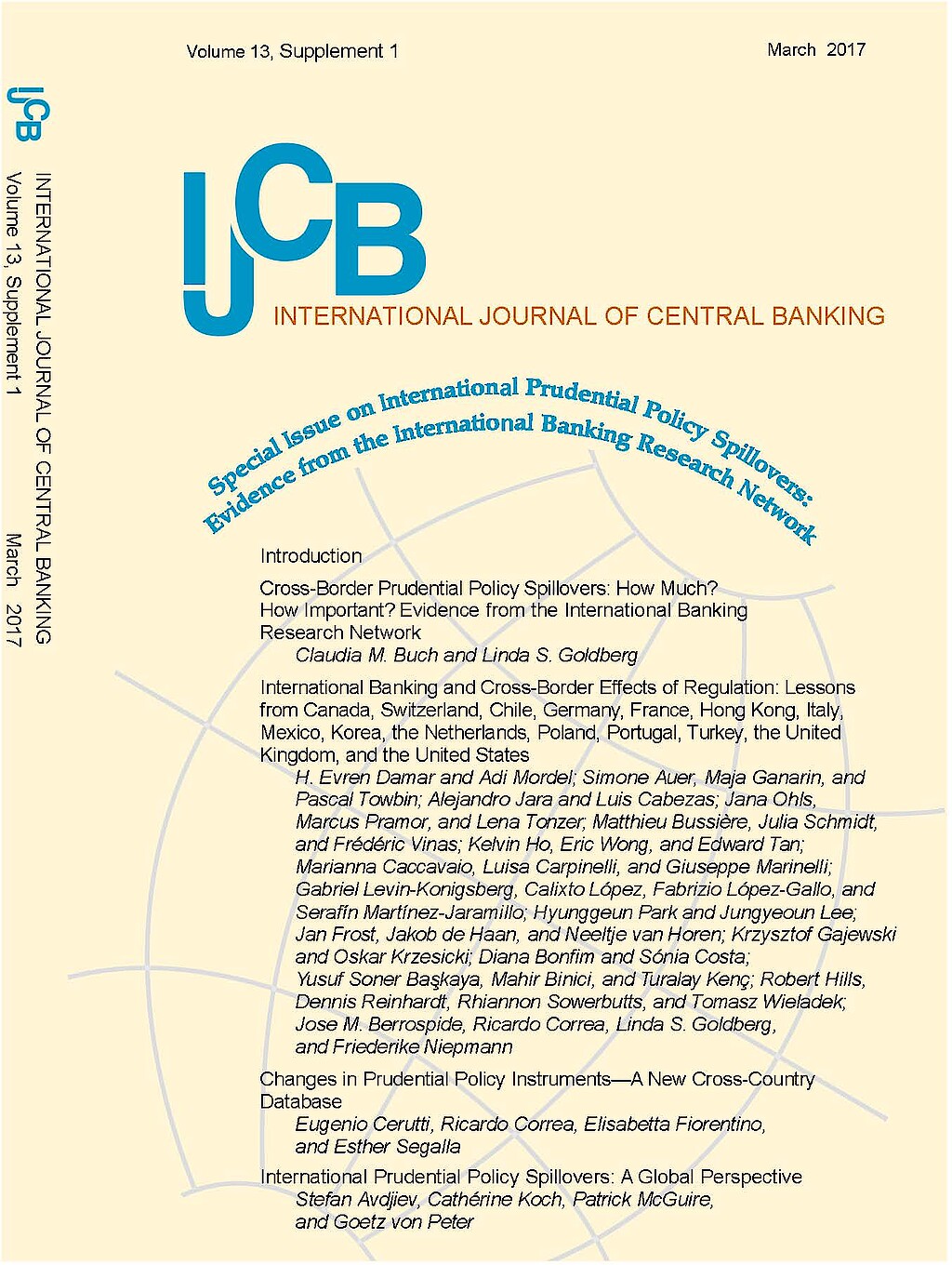
Crises and Rescues: Liquidity Transmission Through Global Banks
in: International Journal of Central Banking, No. 4, 2018
Abstract
This paper shows that global banks transmit liquidity shocks via their network of foreign affiliates. We use the (unexpected) access of German banks' affiliates located in the United States to the Federal Reserve's Term Auction Facility. We condition on the parent banks' U.S. dollar funding needs in order to examine how affiliates located outside the United States adjusted their balance sheets when the U.S. affiliate of the same parent tapped into TAF liquidity. Our research has three main findings. First, affiliates tied to parents with higher U.S. dollar funding needs expanded their foreign assets during periods of active TAF borrowing. Second, the overall effects are driven by affiliates located in financial centers. Third, U.S.- dollar-denominated lending particularly increased in response to the TAF program.
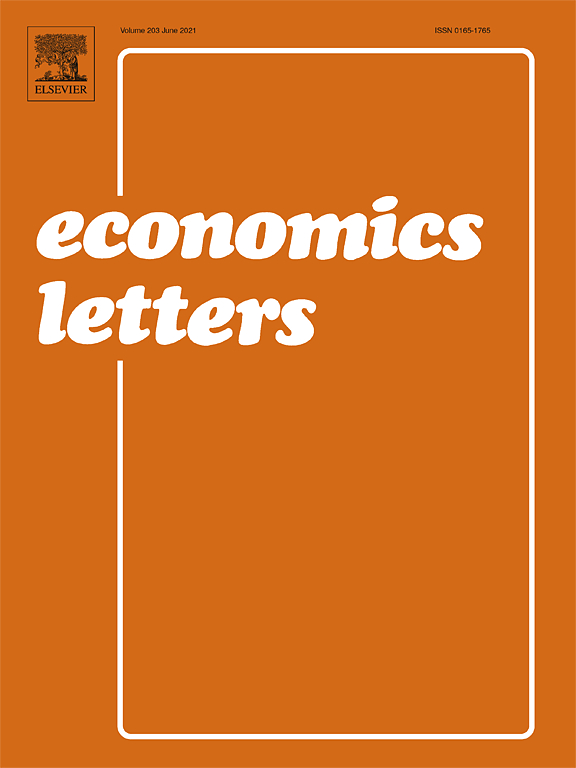
Market Power and Risk: Evidence from the U.S. Mortgage Market
in: Economics Letters, 2018
Abstract
We use mortgage loan application data of the Home Mortgage Disclosure Act (HMDA) to shed light on the role of banks’ market power on their presumably insufficient risk screening activities in the U.S. mortgage market in the pre-crisis era. We find that banks with higher market power protect their charter value. The effect is stronger for banks that have more information about local markets.
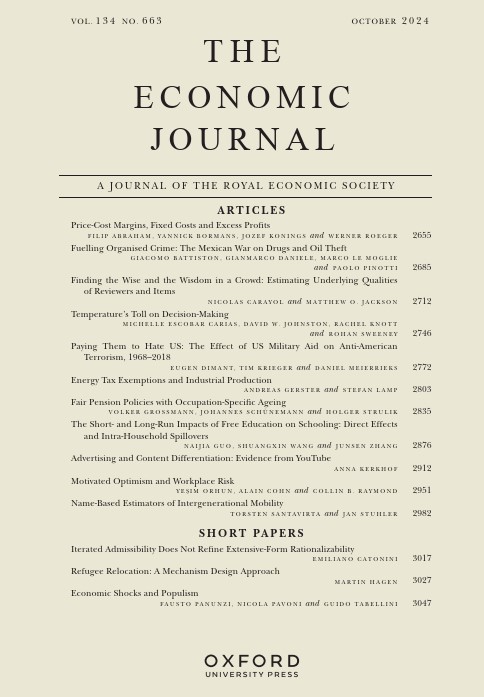
The Political Economy of Financial Systems: Evidence from Suffrage Reforms in the Last Two Centuries
in: Economic Journal, No. 611, 2018
Abstract
Voting rights were initially limited to wealthy elites providing political support for stock markets. The franchise expansion induces the median voter to provide political support for banking development, as this new electorate has lower financial holdings and benefits less from the riskiness and financial returns from stock markets. Our panel data evidence covering the years 1830–1999 shows that tighter restrictions on the voting franchise induce greater stock market development, whereas a broader voting franchise is more conducive to the banking sector, consistent with Perotti and von Thadden (2006). The results are robust to controlling for other institutional arrangements and endogeneity.

What Type of Finance Matters for Growth? Bayesian Model Averaging Evidence
in: World Bank Economic Review, No. 2, 2018
Abstract
We examine the effect of finance on long-term economic growth using Bayesian model averaging to address model uncertainty in cross-country growth regressions. The literature largely focuses on financial indicators that assess the financial depth of banks and stock markets. We examine these indicators jointly with newly developed indicators that assess the stability and efficiency of financial markets. Once we subject the finance-growth regressions to model uncertainty, our results suggest that commonly used indicators of financial development are not robustly related to long-term growth. However, the findings from our global sample indicate that one newly developed indicator—the efficiency of financial intermediaries—is robustly related to long-term growth.

Corporate Social Responsibility and Firm Financial Performance: The Mediating Role of Productivity
in: Journal of Business Ethics, No. 3, 2018
Abstract
This study treats firm productivity as an accumulation of productive intangibles and posits that stakeholder engagement associated with better corporate social performance helps develop such intangibles. We hypothesize that because shareholders factor improved productive efficiency into stock price, productivity mediates the relationship between corporate social and financial performance. Furthermore, we argue that key stakeholders’ social considerations are more valuable for firms with higher levels of discretionary cash and income stream uncertainty. Therefore, we hypothesize that those two contingencies moderate the mediated process of corporate social performance with financial performance. Our analysis, based on a comprehensive longitudinal dataset of the U.S. manufacturing firms from 1992 to 2009, lends strong support for these hypotheses. In short, this paper uncovers a productivity-based, context-dependent mechanism underlying the relationship between corporate social performance and financial performance.
Working Papers
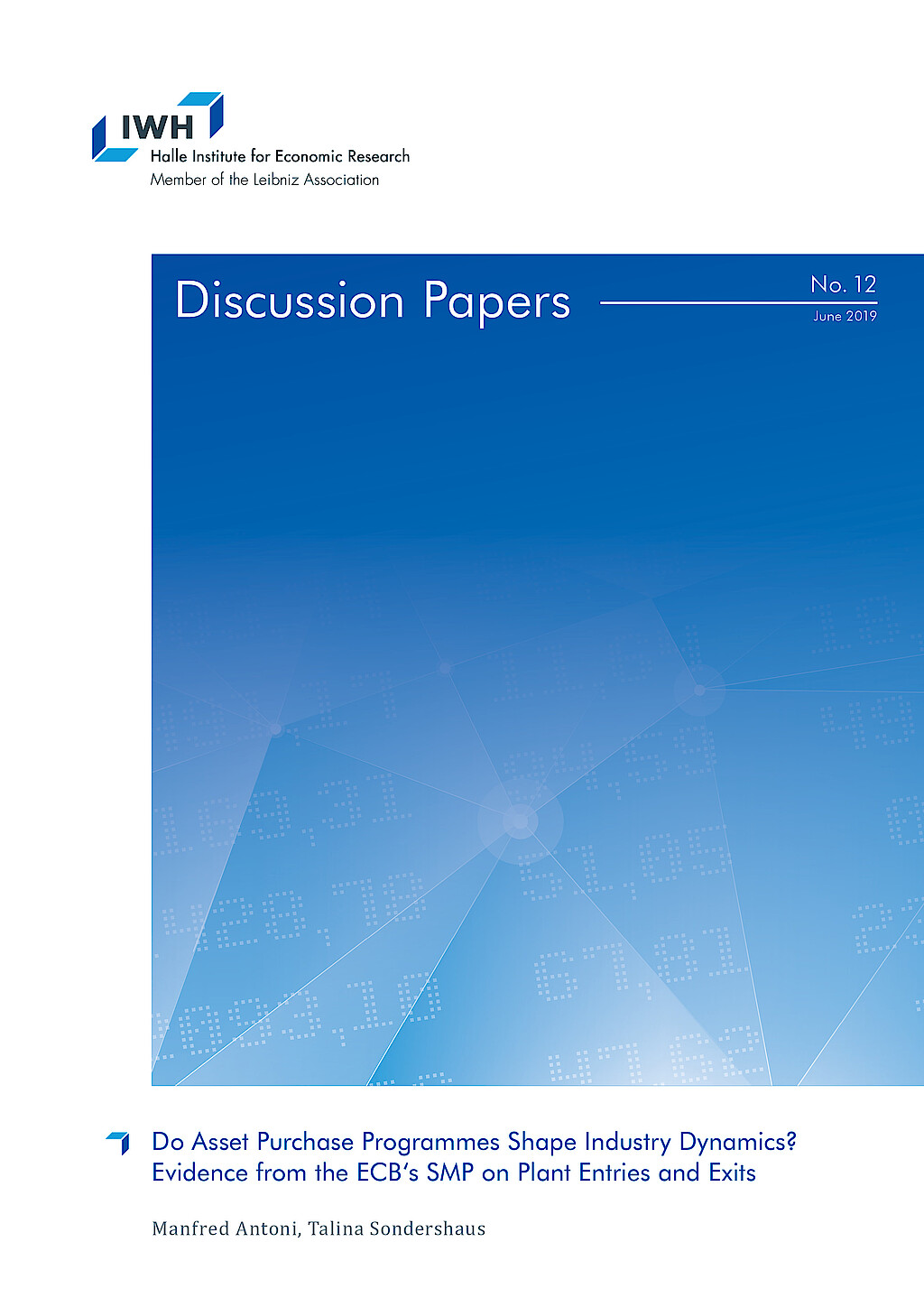
Do Asset Purchase Programmes Shape Industry Dynamics? Evidence from the ECB's SMP on Plant Entries and Exits
in: IWH Discussion Papers, No. 12, 2019
Abstract
Asset purchase programmes (APPs) may insulate banks from having to terminate relationships with unproductive customers. Using administrative plant and bank data, we test whether APPs impinge on industry dynamics in terms of plant entry and exit. Plants in Germany connected to banks with access to an APP are approximately 20% less likely to exit. In particular, unproductive plants connected to weak banks with APP access are less likely to close. Aggregate entry and exit rates in regional markets with high APP exposures are also lower. Thus, APPs seem to subdue Schumpeterian cleansing mechanisms, which may hamper factor reallocation and aggregate productivity growth.

‘And Forgive Us Our Debts’: Do Christian Moralities Influence Over-indebtedness of Individuals?
in: IWH Discussion Papers, No. 8, 2019
Abstract
This paper analyses whether Christian moralities and rules formed differently by Catholics and Protestants impact the likelihood of households to become overindebted. We find that over-indebtedness is lower in regions in which Catholics outweigh Protestants, indicating that Catholics‘ forgiveness culture and a stricter enforcement of rules by Protestants serve as explanations for our results. Our results provide evidence that religion affects the financial situations of individuals and show that even 500 years after the split between Catholics and Protestants, the differences in the mind-sets of both denominations play an important role for situations of severe financial conditions.
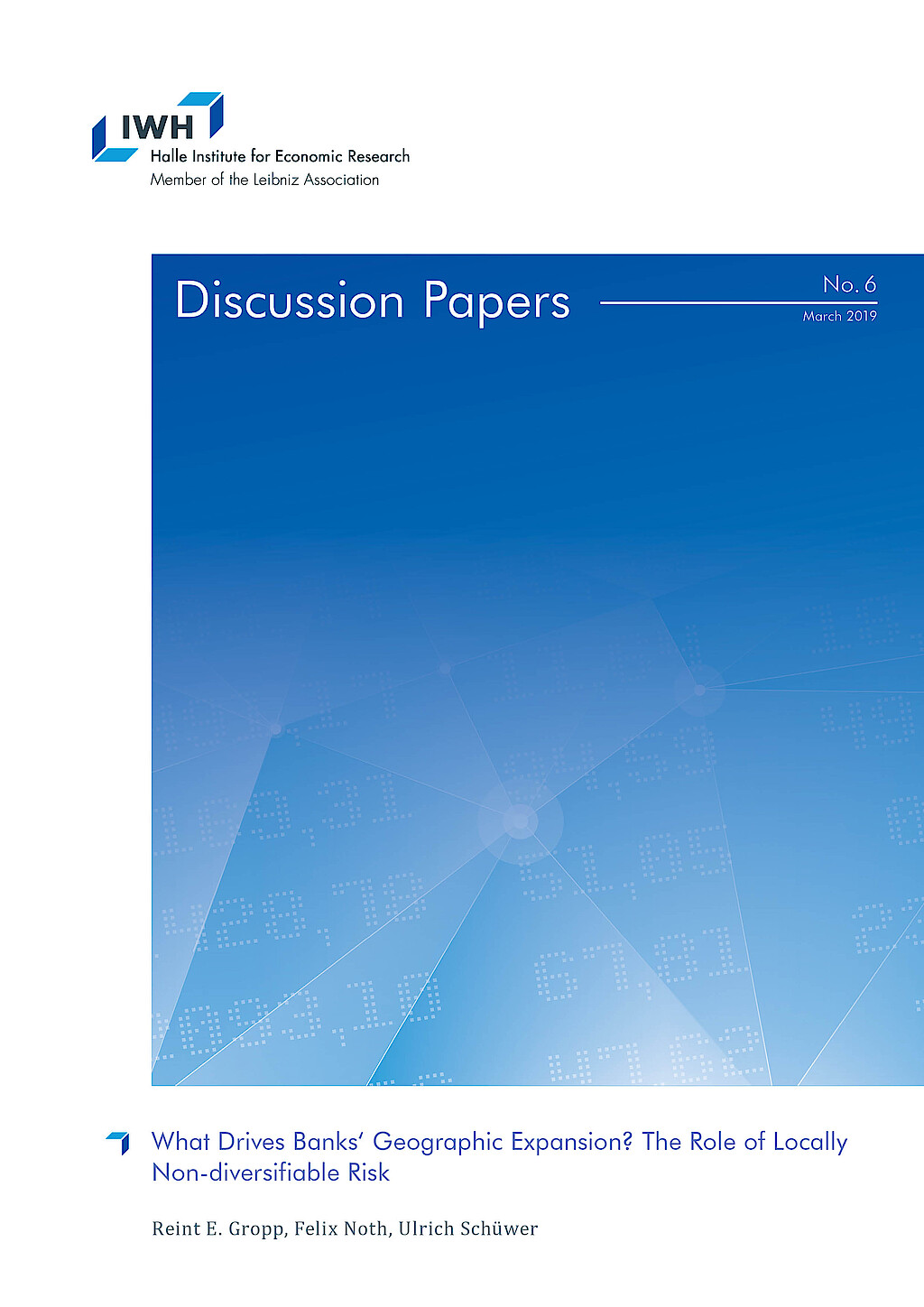
What Drives Banks‘ Geographic Expansion? The Role of Locally Non-diversifiable Risk
in: IWH Discussion Papers, No. 6, 2019
Abstract
We show that banks that are facing relatively high locally non-diversifiable risks in their home region expand more across states than banks that do not face such risks following branching deregulation in the 1990s and 2000s. These banks with high locally non-diversifiable risks also benefit relatively more from deregulation in terms of higher bank stability. Further, these banks expand more into counties where risks are relatively high and positively correlated with risks in their home region, suggesting that they do not only diversify but also build on their expertise in local risks when they expand into new regions.

Politics, Banks, and Sub-sovereign Debt: Unholy Trinity or Divine Coincidence?
in: Deutsche Bundesbank Discussion Paper, No. 53, 2018
Abstract
We exploit election-driven turnover in State and local governments in Germany to study how banks adjust their securities portfolios in response to the loss of political connections. We find that local savings banks, which are owned by their host county and supervised by local politicians, increase significantly their holdings of home-State sovereign bonds when the local government and the State government are dominated by different political parties. Banks' holdings of other securities, like federal bonds, bonds issued by other States, or stocks, are not affected by election outcomes. We argue that banks use sub-sovereign bond purchases to gain access to politically distant government authorities.
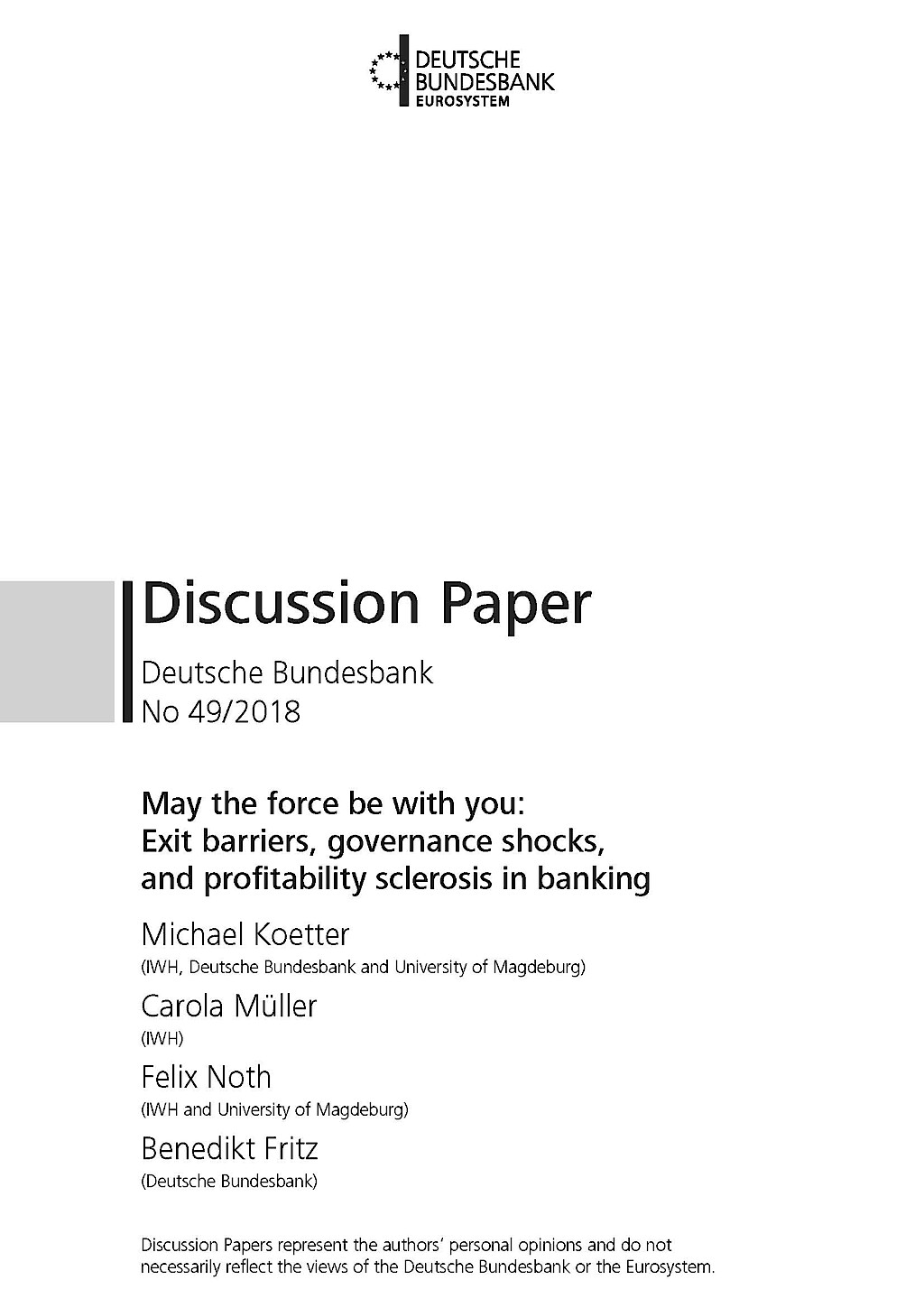
May the Force Be with You: Exit Barriers, Governance Shocks, and Profitability Sclerosis in Banking
in: Deutsche Bundesbank Discussion Paper, No. 49, 2018
Abstract
We test whether limited market discipline imposes exit barriers and poor profitability in banking. We exploit an exogenous shock to the governance of government-owned banks: the unification of counties. County mergers lead to enforced government-owned bank mergers. We compare forced to voluntary bank exits and show that the former cause better bank profitability and efficiency at the expense of riskier financial profiles. Regarding real effects, firms exposed to forced bank mergers borrow more at lower cost, increase investment, and exhibit higher employment. Thus, reduced exit frictions in banking seem to unleash the economic potential of both banks and firms.



















